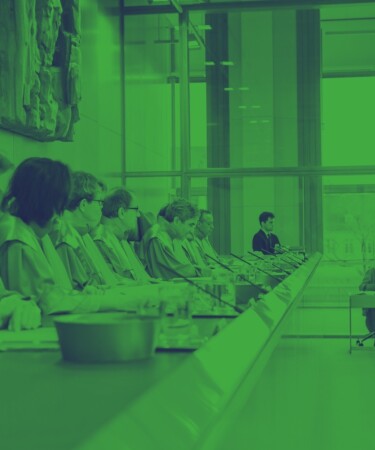The Society for Civil Rights (GFF) goes to court with its partners to protect fundamental and human rights in Germany and Europe.
Even though fundamental and human rights are enshrined in law, they are not always respected by the government and by companies. Strategic litigation before German and European courts is an indispensable tool for enforcing these rights. Its aim is to bring about far-reaching social change beyond individual lawsuits.
These so-called precedents are groundbreaking, since the Federal Constitutional Court can overturn laws. All other government bodies are bound by its rulings.
The GFF is doing pioneering work in the field of strategic litigation for fundamental and human rights in Germany. Of particular importance to our success is
- that we carefully select our cases and
- that we work in strong alliances with plaintiffs, other lawyers, and civil society initiatives.
As a growing organization, we focus on three key work areas:
Strong fundamental rights for a vibrant democracy,
freedom in the digital age, and
equal rights and social participation.
The following criteria guide us in selecting our cases:
- We advocate for a free and solidarity-based society and are committed to fighting discrimination, exclusion, and surveillance.
- We fight for court decisions that serve as guidelines beyond the individual case.
- We mainly defend citizens against the government. But fundamental rights also apply in relation to companies. When we intervene, we do so on behalf of groups of people without a strong lobby: for example, tenants, the free press, and those who are discriminated against and marginalized.
CAREFUL PLANNING, RELIABILITY, AND PERSEVERANCE
We approach our cases with care. We pool our expertise and resources to ensure that fundamental rights are upheld in the best possible way. To this end, we have a team of lawyers with a high level of specialist expertise, we undergo continuous training, and we work with external academics and lawyers on specific topics.
We network, forge alliances with other organizations, and draw the attention of media representatives to the weaknesses of our society based on the rule of law.
We are also active outside of specific court cases and appeal proceedings. For example, in order to prevent laws that violate fundamental rights from being passed, we intervene in the legislative process with constitutional arguments. In cooperation with our alliance partners, we offer legally sound policy and advocacy work.
RAISING AWARENESS
Part of our strategy is to draw broad attention to structural problems and stimulate discourse in society. In addition to providing legal expertise, the GFF accompanies its cases with information-oriented public relations work. To this end, we translate complex legal issues into accessible language. In the media, the GFF works to ensure that reporting accurately presents the facts and gives fundamental rights issues the focus they deserve.
This way, we want to guarantee that our work for fundamental and human rights is legally and socially sustainable.
EVERY CASE ADVANCES HUMAN RIGHTS
An obvious marker for our success is, of course, winning a case in court. However, even if we do not succeed, we know that we have opened up opportunities for the advancement of human rights. This is due to the fact that lawsuits and court proceedings can build on each other strategically. Work on a lost case can provide important groundwork for a later, bigger case. At a higher judicial instance, it may then have better prospects of success.
Moreover, regardless of its outcome, each lawsuit creates an opportunity to engage with the public on fundamental rights issues. We can use the case to to raise awareness of a problem and, jointly with those affected, provide a new perspective on it. Even — or especially — spectacular defeats for fundamental rights can help pave the way for legislative changes or political measures.

